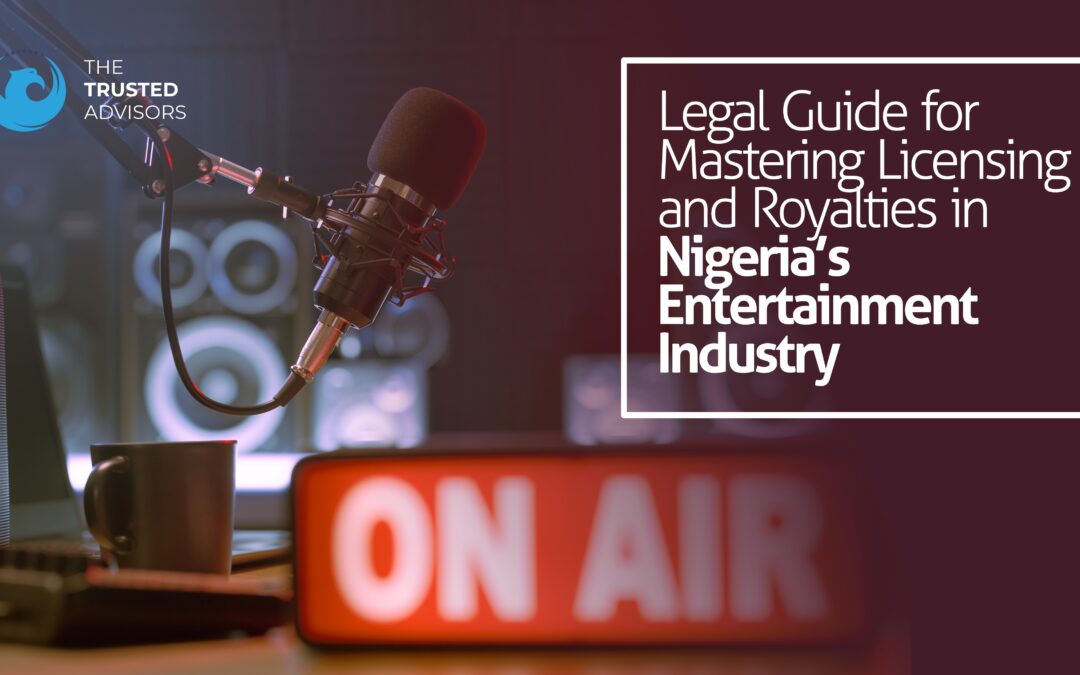Creative works produced by entertainers are largely protected by copyright. They have exclusive control over their work. The copyright owner is granted the sole right to record music, produce, sell, or distribute copies of the music in various formats (hardware and software), stream the music, stage a public performance of the music, reproduce, or create new work from the original work (for example, modifying one’s music to create a new song).
In some instances, the copyright owner (the licensor) may decide to license the exploitation of one or more of these rights to another person (the licensee) in return for royalties, which can be a lump-sum payment or some form of compensation (either monetary or non-monetary).
Licensing
Licensing is a crucial aspect of the entertainment industry, particularly for Nigerian artists. According to the Black’s Law Dictionary, the granting of a license is defined as
“The permission by competent authority to do an act which without such permission, would
be illegal, a trespass, a tort, or otherwise would not allowable.”[i]
Music licensing is the licensed use of copyrighted music. Music Licensing is intended to ensure that the owners of copyrights on musical works are compensated for certain uses of their work
Types of Music License
There are various types of Music License and they are listed below:
- Master Recording License
- Mechanical License
- Synchronisation License
- Theatrical License
- Public Performance License
- Blanket License
- Print License
Royalties
Royalties are payments that one party makes to another party that is the owner of an intellectual property or real property asset. Royalties are the payments generated from the usage of your songs. When recordings get played and streamed – or performed or covered – a song’s rights holders receive payments.[ii]
Types of Royalties
- Neighboring Rights and Royalties
- Digital performance Royalties
- Sync Licensing Fees
- Public Performance Royalties
- Mechanical Royalties
Legal Framework for Nigerian Entertainment Professionals
There is no definite legal framework regulating entertainment in Nigeria. However, there are other laws related to entertainment because it is intellectual property-related. The laws that regulate and govern intellectual property in Nigeria form the foundation of the legal framework for the media and entertainment industry because the majority of the media and entertainment activities are intellectual property related.
Companies and Allied Matters Act 2020
Before the commencement of any business operations such as record labels, film production companies, or management, in the entertainment industry in Nigeria, one must register a business name, company, or partnership with the Corporate Affairs Commission. The Act establishes the Corporate Affairs Commission (CAC) which is the government agency established for registration and regulation of companies in Nigeria.[iii]
The National Broadcasting Commission Act
NBC regulates and governs the broadcasting sector such as radio, and television of the media industry in Nigeria. The Act establishes the National Broadcasting Commission in Section 1 and empowers the Commission to regulate and control the broadcasting industry amongst others.
It also provides that to operate a radio, sound, television, cable, or satellite station, a license is to be issued and granted by the National Broadcasting Commission as empowered by Section 9 of the Act.
The Copyrights Act
Copyright is the exclusive right granted to an originator of creative work to use, publish, produce, and reproduce the work for a given period. The Copyright Act provides for the protection, transfer, infringement, penalty, the remedy of the creative works of authors, artistic works, songwriters, music publishers, cinematograph films, photographers, and all-round creatives in the media and entertainment industry. This protection grants the creator the exclusive right to control the use of his creative works and prevent unauthorized persons from copying, adapting, or passing off a creative work as theirs.
Section 1 of the Act provides that the following listed works in media and entertainment are eligible for copyright;
• Literary works;
• Musical works;
• Artistic works;
• Cinematograph films;
• Sound recordings and;
• Broadcast.
Also, it is important to note that Section 39 of the Nigerian Copyright Act accommodates a society to govern the interest of artists. There are two societies of such in Nigeria namely; The Copyright Society of Nigeria (COSON) and the Musical Copyright Society of Nigeria (MCSN). These societies are authorized by the Nigeria Communications Commission to collect royalties for the benefit of creatives.
Musical Copyright Society Nigeria (MCSN).
Mechanical royalties are gathered and circulated in Nigeria by the Musical Copyright Society Nigeria (MCSN). The Musical Copyright Society Nigeria (MCSN) is a collective management organization (CMO) that operates in Nigeria. It is one of the organizations responsible for the collection and distribution of royalties on behalf of musicians, composers, and other rights holders in the Nigerian music industry.[iv]
The Copyright Society of Nigeria (COSON)
The Copyright Society of Nigeria (COSON) is also another collective management organization (CMO) that operates in Nigeria. It was established in 2010 and is recognized by the Nigerian Copyright Commission (NCC) as one of the CMOs for musical works and sound recordings in Nigeria. COSON’s basic role is to safeguard the freedoms of music creators, such as artists, composers, songwriters, and music distributors, and guarantee they get fair remuneration for the utilization of their protected works.[v]
Conclusion
Royalties are essential in supporting Entertainers in Nigeria. Performance royalties, mechanical royalties, and synchronization royalties structure the monetary system supporting the Nigerian music industry.
[i] https://papers.ssrn.com/sol3/papers.cfm?abstract_id=4303993 accessed on 21/02/2024
[ii] https://dittomusic.com/en/blog/how-do-music-royalties-work#:~:text=When%20recordings%20get%20played%20and,print%20music%2C%20and%20sync%20royalties accessed on 21/02/2024
[iii] https://www.mondaq.com/nigeria/broadcasting-film-tv–radio/1039336/overview-of-media-and-entertainment-law-in-nigeria accessed on 23/02/2024
[iv] https://aocsolicitors.com.ng/music-royalties-in-nigeria/ accessed on 23/02/2024
[v] https://aocsolicitors.com.ng/music-royalties-in-nigeria/ accessed on 23/02/2024
Written by Elizabeth Olalekan for The Trusted Advisors
Email us: [email protected]

